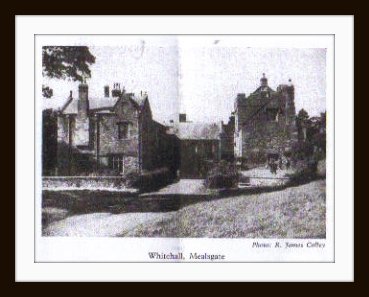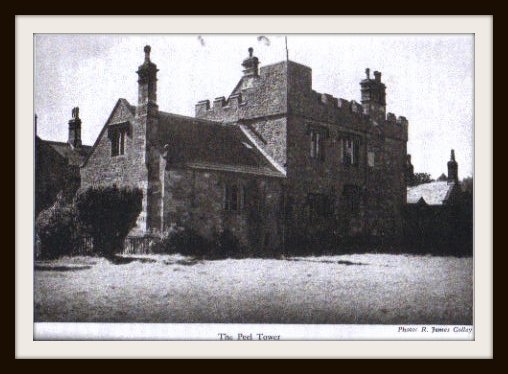Transcription of an Extract from St Aubyn's School Magazine : 75th Anniversary Number (1961) kindly supplied by Mr Dixon, Scool's Archivist.
WHITEHALL CUMBERLAND
(Re-printed from the School Magazine, March 1940)
Shortly after the September crisis of 1938, which, with its settlement at Munich, brought to the world a breathing space, we at St Aubyn's set to work to make all plans in readiness to meet any future crisis that might arise, so that never again should we be found unprepared if the dangers of war were once more to arise.
After much searching a large and historic old house tucked away in the shadow of Skiddaw was inspected, found suitable, and was rented for a period of years.
The house was Whitehall, in the parish of Mealsgate, an old border castle with a Peel or watch tower from which in the distant past a look-out was kept for marauding bands of Scots coming over the Solway at low tide in search of cattle and booty.
Alterations and renovations were pushed on here so that the house was kept in a state of readiness, The lighting had to be overhauled, an engine installed to drive the plant making the house's own light; and some furniture - principally tables, chairs, and bedsteads - were sent up north from Woodford.
Parents' meetings had also been held at Woodford and a list had been compiled of those boys whose parents wished them to be evacuated to Whitehall should war break out.
Such was the state of affairs when the new crisis arose in the late summer of 1939. The Headmaster was at the time in Scotland, but we hurried down to Cumberland, to Whitehall, when it seemed that war was almost inevitable. It was decided to get several loads of furniture up from Woodford while transport was still relatively easy to procure. And so, when on that fateful Sunday the long feared war at last broke over Europe, Whitehall was ready to receive all those boys who wished to go there straight away - some two to three weeks before the actual winter term was due to start. In fact some boys were safely settled in their new home before war was declared. Others followed at irregular intervals during the following week or ten days.
That autumn of '39 was one of the most beautiful that the north-west of England had experienced for a decade or more. For week after week the sun shone and mild winds blew. And for the boys at Whitehall, busy out in the sunshine, gardening, log cutting, hiking and playing in the grounds, the war seemed a distant and unreal thing.
The new term was started on September 20th, the date arranged long before the crisis had arisen, and long before the move to the north had been decided on, and everything was soon in working order.
It may not be without interest to give some idea of how the days are mapping out under the altered conditions under which the School is now working.
On weekdays the boys get up at half-past seven and breakfast is at eight o'clock. After breakfast the boys all return to their dormitories where they make their own beds. Then they may take a walk in the grounds until the bell summons them into the hall for morning prayers. School follows at nione o'clock and continues till eleven. A long "break" until a quarter to twelve comes at eleven o'clock. After the boys have had lunch they get out for a brisk walk or attend a physical instruction class. Two more school periods follow before lunch at one o'clock. Lunch over the boys go to their dormitories for a rest period lasting until a quarter past two. The afternoon is devoted to games, to walks and to gardening, while on certain days the Scouts and the Cubs are active. A school period at a quarter past four precedes high tea at five o'clock, and a final school period from half-past five till ten-past six completes the day's lessons. Evening prayers are held in hall at twenty-past six, and preparation follows until seven o'clock for the senior and middle school. After supper at seven all the boys go to bed, and lights are out at half-past eight. On Wednesdays and Saturdays there are no school periods after lunch, and on Saturday and Sunday evenings during the darker months there are cinematograph performances in the hall.
On Sundays the boys do not get up till half-past eight, and breakfast is at nine. Letter writing then follows until half-past ten. At a quarter to eleven morning service is held in the hall; some eight or ten boys forming the school choir. Lunch is at one. In the afternoon the boys go for a walk, returning for high tea at five o'clock. In the evening there is the cinema in the winter, and in the summer the boys amuse themselves in the grounds till seven o'clock when they come in for supper and then go to bed.
And what of Whitehall itself? It is, of course, famous all over Cumberland and perhaps farther afield as the country home of the great George Moore, and has been well described in Dr Samuel Smiles's life of that great philanthropist.
As a mere boy, when living at Mealsgate, George Moore had often visited the ruined towers of Whitehall where he climbed in search of birds' nests. Even in those days he dreamed of one day possessing the Whitehall estate and of rebuilding Whitehall and restoring it to its former beauty.
After many years George Moore's great ambition was at last fulfilled in 1858 when he did indeed become the possessor of Whitehall. He immediately set to work to rebuild the old house, and entrusted the work, which took some four years to complete, to the famous architect Mr Salvin. At one time there were over two hundred workmen employed in the rebuilding. The old rooms were preserved together with the old rafters, and the general outline of the old house was altered as little as possible.
Finally, on October 2nd, 1861, George Moore sat down to dinner for the first time in the magnificent oak-panelled dining hall with its suit of armour, spears, horned heads, flags and banners.
Whitehall (photo R.J. Colley courtesy Mr N. Dixon)

The Pele Tower (photo R.J. Colley courtesy Mr N. Dixon)

Here at Whitehall Mr Moore spent some of the happiest years of his life. He was always a busy man, even when he came away into the country, and though he could and did relax at his country seat, yet spent many hours each day busy with his enormous correspondence. He would go regularly from his breakfast in the hall across to his study - which we now use as our Fourth Form class-room - and there from ten o'clock till two in the afternoon he would work steadily through his morning's mail, scattering on the floor around him the letters as he answered them.
One cannot help wondering what the shade of that great man thinks as it sees the hall filled at meal times with a chattering crowd of schoolboys, and what of his study where he worked so hard? In his lifetime he loved children and was never so happy as when parties of them were being entertained and made happy at Whitehall, so we may think with certainty that now he could feel nothing but pleasure that the house that he rebuilt should be sheltering children from the possible horrors of war, and that once again children are finding pleasure and happiness in the beautiful surroundings of the Whitehall that he loved so dearly in his own lifetime.
Read more about MEMORIES OF CUMBERLAND